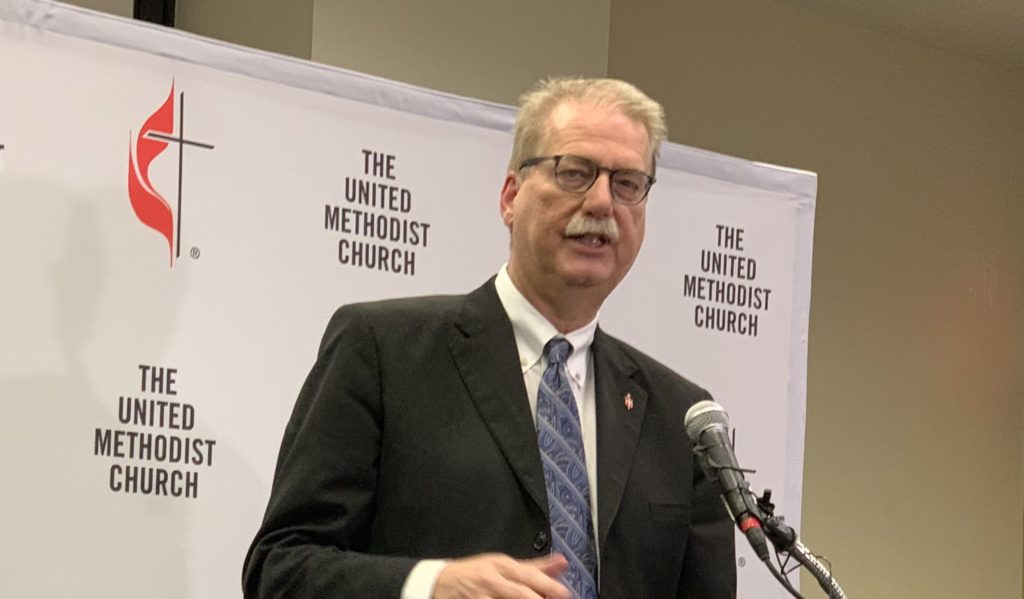The implosion of the 13-million-member global United Methodist Church has accelerated as 106 conservative Florida congregations are suing their liberal bishop, Kenneth Carter, for better terms as they quit the denomination. This schism of America’s largest liberal Mainline denomination represents the wider collapse of 20th century liberal Protestantism, whose leading institutions are fast receding if not dying.
Hundreds of other local churches across America have already quit United Methodism, as will thousands more congregations. America’s third largest denomination is splitting over both sex and doctrine.
(Read here.)






Comment by David on September 1, 2022 at 5:24 pm
I suspect if the Methodist Episcopal Church, South, had not merged with the Methodist Episcopal Church, the present dispute over division may not have arisen. The southern church was always conservative and at times sought to ban divorce among its members. The Africans probably should have their own denomination and not be governed by the “Great White Fathers’ in the US. Their societies are rather different from ours and there still are widespread beliefs regarding witches and their punishments.
As a non-Methodist, I can understand the argument that church property should remain with the local congregation unless large sums from the central denomination were put into it. Obviously, it is only just that clergy pensions be protected. They are often not high earners and have families to support.
A recent poll showed that approval of same-sex marriage is now at 71% among Americans. It would seem that churches that approved of this would be more popular than those that opposed it. There seems to be a lot of “post hoc” reasoning in regard to church decline. Churches may have lost members, but where did they go—to other churches or the cemetery? Given that so many Methodists are of the older generation, the decline is a matter of time. Most denominations are having serious difficulty in attracting and retaining younger members.
Comment by Tom on September 1, 2022 at 5:30 pm
I don’t think that the merger was the cause. Granted I don’t know what the Southern Methodist church was like. But before their merger, the Southern Presbyterians weren’t much better than the Northern ones. Which is why the big departure of the conservative Southern Presbyterians happened in 1973, a full 9 years before the merger.
Your observation that 71% of Americans approve of homosexual marriage and should thus join liberal churches is right on. So why don’t they? Because they are not the church-going type in the first place. The connection of pro-homosexual people to a church, if any, was always weak. Once they have abandoned the Bible and its teaching on homosexuality (among many other things; homosexuality is just the hot button of the moment), there is really no reason for them to go to church at all.
Comment by David S. on September 1, 2022 at 5:49 pm
The rural area of Central Georgia, where I am from is pretty evenly split between Methodist and Baptist congregations. Every community seems to have one of each. But it is no great surprise that there are so many Methodist congregations as Georgia’s Methodists and Wesleyans have great affinity for the Wesley brothers, given their time in early Colonial Georgia. At least one local congregation in the area seems to be departing as a result of the recent approval by the North Georgia Conference of 70 departures, since while it remains listed on the denomination website, “United” has been blackened over on the church sign. I wouldn’t be surprised if at least one other local congregation, which we attended for a while and has long dropped the “United Methodist” name from its signage departs as well, and a third serving the immediate community is a toss-up. What happens to the two big Methodist churches, located in the county seats where I grew up and where we conducted most of our business, will be interesting to see. Of the two, I am more familiar with the one where I grew up. It was more receptive to the participation of a now deceased, openly gay friend participating in a semi-official capacity of the life of the church during times when he had a boyfriend. But his family’s home church, where many are buried, he was restricted from service, during times in which he would be in an active relationship with another male, so who knows what they plan to do.
Certain other churches, where I now live, that are located in or near the City of Atlanta proper, may be considering leaving as new signage says “XXXX Church” with what appears to be a temporary sign, reading “a United Methodist congregation”, attached beneath the main sign. It appears that Bishop Sue and her cabinet are focusing on trying to prevent all the big fish from leaving at any costs, as evidenced by Mount Bethel, and in defiance of the 2019 provision, while exhibiting grace to the small fish in line with the 2019 provision.
Comment by Reynolds on September 1, 2022 at 8:00 pm
Bishop Sue is not dumb like RHE WCA. She will let the poor go and make the rich poor as they go. She is on it for the money. I am amazed how long it took the WCA to drop the word Protocol. I knew they were never going allow that vote to happen. Now it will be lawsuit time. Georgia has never decided on the trust clause. Texas churches are free to go whenever they want. The don’t have to pay a penny to leave.
Comment by Dan W on September 1, 2022 at 9:46 pm
David, Christians like myself who grew up in the UMC are grateful for the Pastors, Sunday school teachers and lay leaders/youth leaders we knew. The UMC made some fine disciples. It was awesome growing up in the UMC in the 1970s.
David S, I’ve known Georgia Methodists and Baptists my whole life – salt of the Earth. I believe Bishop Sue thinks she is doing the right thing. Sadly she is not.
Cheers, It’s all part of God’s plan.
Comment by Star Tripper on September 2, 2022 at 9:37 am
Methodists were stereotyped as taking the bureaucracy of the Anglican church but leaving the pageantry. Such a bureaucratic end to the denomination is of a piece with that.